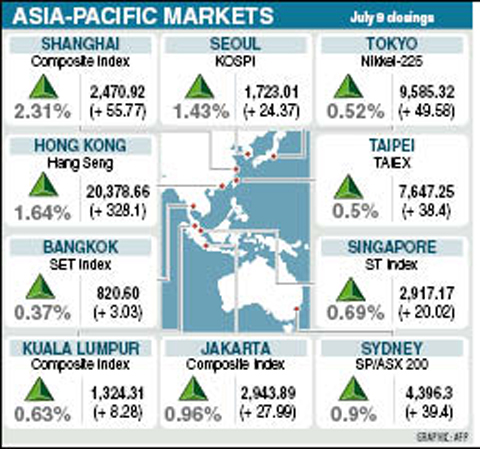Asian stocks had their biggest weekly gain this year after US retail-sales rose and the IMF increased its forecast for global economic growth.
Sony Corp, an electronics maker that gets more than a fifth of its sales in the US, jumped 5.8 percent this week in Tokyo. Jiangxi Copper Co (江西銅業), China’s biggest producer of the metal, gained 8.6 percent in Shanghai after copper prices climbed. Santos Ltd surged 15 percent in Sydney after newspapers said Royal Dutch Shell PLC may buy a stake in Australia’s third-largest oil and gas producer.

The MSCI Asia-Pacific Index rose 4 percent this week. It has fallen 3.6 percent this year on concern Europe’s debt crisis and China’s measures to curb inflation will slow global growth.
“I doubt we’ll have another global recession,” said Masayuki Kubota, a fund manager at Tokyo-based Daiwa SB Investments Ltd, which oversees about US$51 billion in assets. “People are very sensitive to economic data from the US If something good comes out, market sentiment easily rebounds. I’m buying sectors which were sold on excessive pessimism.”
Japan’s Nikkei 225 Stock Average rose 4.1 percent this week, as a weaker yen buoyed the profit outlook for exporters.
Taiwan’s TAIEX index jumped 4.3 percent, the most among major benchmark indexes in the Asia-Pacific region. The TAIEX closed up 0.50 percent on Friday on follow-through buying after an overnight rally on Wall Street, dealers said.
The weighted index rose 38.40 points to 7,647.25, after moving between 7,599.84 and 7,652.55, on turnover of NT$102.08 billion (US$3.18 billion).
HTC Corp (宏達電), the maker of Google Inc’s Nexus One mobile phone, soared 19 percent in Taipei after reporting higher profit and getting rating upgrades. HTC jumped 19 percent to NT$526 in Taipei after reporting second-quarter profit that beat estimates as demand for Google’s Android phones drove sales to a record. Citigroup Inc boosted the stock to “buy” from “sell.”
Allan Lin, an analyst with Concord Securities (康和證券), said that despite Wall Street’s three-digit overnight rise, the local bourse moved in a narrow range with small-and medium-cap stocks turning active.
Other markets on Friday:
Manila closed 0.10 percent lower, pulled down by last-minute profit-taking. The composite index fell 3.60 points from Thursday to 3,394.56 points.
Wellington closed 0.71 percent higher, although trading was light. The benchmark NZX-50 index gained 21.32 points from Thursday to 3,005.25.
Mumbai closed up 1.03 percent as European markets firmed on positive US economic data. The benchmark 30-share SENSEX index closed up 181.81 points from Thursday at 17,833.54.

MORE VISITORS: The Tourism Administration said that it is seeing positive prospects in its efforts to expand the tourism market in North America and Europe Taiwan has been ranked as the cheapest place in the world to travel to this year, based on a list recommended by NerdWallet. The San Francisco-based personal finance company said that Taiwan topped the list of 16 nations it chose for budget travelers because US tourists do not need visas and travelers can easily have a good meal for less than US$10. A bus ride in Taipei costs just under US$0.50, while subway rides start at US$0.60, the firm said, adding that public transportation in Taiwan is easy to navigate. The firm also called Taiwan a “food lover’s paradise,” citing inexpensive breakfast stalls

TRADE: A mandatory declaration of origin for manufactured goods bound for the US is to take effect on May 7 to block China from exploiting Taiwan’s trade channels All products manufactured in Taiwan and exported to the US must include a signed declaration of origin starting on May 7, the Bureau of Foreign Trade announced yesterday. US President Donald Trump on April 2 imposed a 32 percent tariff on imports from Taiwan, but one week later announced a 90-day pause on its implementation. However, a universal 10 percent tariff was immediately applied to most imports from around the world. On April 12, the Trump administration further exempted computers, smartphones and semiconductors from the new tariffs. In response, President William Lai’s (賴清德) administration has introduced a series of countermeasures to support affected

CROSS-STRAIT: The vast majority of Taiwanese support maintaining the ‘status quo,’ while concern is rising about Beijing’s influence operations More than eight out of 10 Taiwanese reject Beijing’s “one country, two systems” framework for cross-strait relations, according to a survey released by the Mainland Affairs Council (MAC) on Thursday. The MAC’s latest quarterly survey found that 84.4 percent of respondents opposed Beijing’s “one country, two systems” formula for handling cross-strait relations — a figure consistent with past polling. Over the past three years, opposition to the framework has remained high, ranging from a low of 83.6 percent in April 2023 to a peak of 89.6 percent in April last year. In the most recent poll, 82.5 percent also rejected China’s

PLUGGING HOLES: The amendments would bring the legislation in line with systems found in other countries such as Japan and the US, Legislator Chen Kuan-ting said Democratic Progressive Party (DPP) Legislator Chen Kuan-ting (陳冠廷) has proposed amending national security legislation amid a spate of espionage cases. Potential gaps in security vetting procedures for personnel with access to sensitive information prompted him to propose the amendments, which would introduce changes to Article 14 of the Classified National Security Information Protection Act (國家機密保護法), Chen said yesterday. The proposal, which aims to enhance interagency vetting procedures and reduce the risk of classified information leaks, would establish a comprehensive security clearance system in Taiwan, he said. The amendment would require character and loyalty checks for civil servants and intelligence personnel prior to